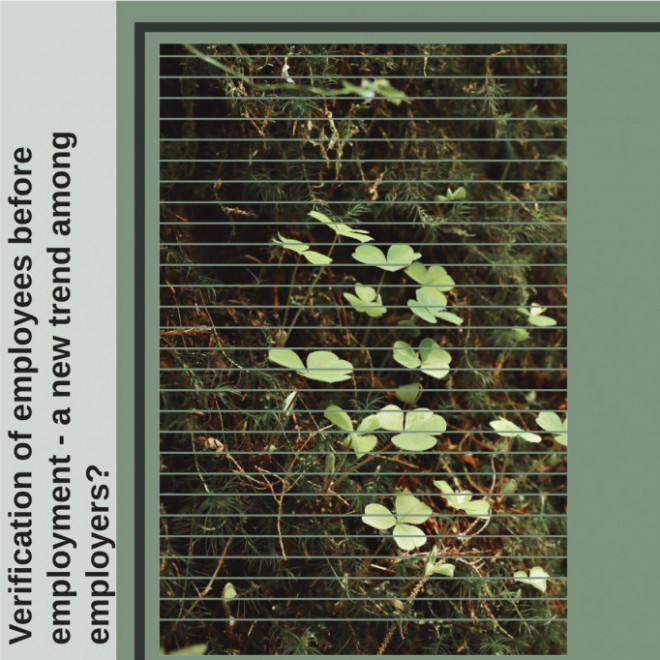More and more employers, when hiring a person for a key position, also decide to check their past - both professional and personal - and this before starting cooperation with them. From the point of view of, for example, a financial institution, such a process is necessary to trust an employee who will occupy a key position in a given organization.
CV selection, finding and employing the perfect candidates for a job is a very demanding job. Recruiters have to assess different personalities, often compare completely different experiences and education, and finally narrow down the list of candidates, rejecting most of them. Even the candidates themselves can create problems, as it happens that some of the information provided in the CV is false, which further complicates the work of the HR department. So how do companies verify candidates' CVs to protect themselves from hiring a fraudster?
After completing the application phase in the recruitment process, there are piles of CVs to be filtered in front of the HR department employees, although currently mostly virtual. Verifying the information contained in the CV is a very important step in the process of hiring a new employee. Increasing competitiveness on the labor market very often makes candidates exaggerate or even falsify some information in their CVs.
"Innocent Lies"
Job applicants often try to hide their inexperience with lies they consider innocent. CVs presented to recruiters are not considered to be an official document. Like a cover letter, it is a private document with no legal presumption that its content represents the actual state of affairs. The situation is different in the case of presenting false documents confirming completed studies or training. In such a case, we can even speak of committing a crime.
In the HireRight report on employment analysis in 2019, it was found that as many as 83% of employers caught job candidates declaring falsehoods in their resumes. If the recruiter at this stage does not reliably verify the information contained in the candidate's CV, it may turn out to be an extremely costly mistake. When the truth comes to light, the need to re-recruit may be the mildest of consequences.
Basic methods of verification
Of course, recruiters are not at their best. They have at least four very effective methods of verifying what the candidate wrote about in their CV:
CALL
This is the initial stage of candidate verification. During the interview, the recruiter may ask about some doubts or inaccuracies in the CV. At this stage, it is also possible to detect irregularities in the information provided by the applicant for a given position.
COMPETENCE TESTS
In order to verify a candidate's skills and knowledge, employers often rely on tests or quizzes to help them eliminate people who do not have the declared competences and abilities.
Such a test can be used already at the stage of sending the CV, which automatically excludes some applications. It can also be the next stage of recruitment. For example, you may be asked to complete a test in the form of an exam in the Banking Law Act if you are applying for a job related to finance. For a graphic designer, the competency test may be to prepare a project in accordance with the guidelines of the recruiter.
Taking into account that the tests are based on the skills and knowledge of the candidate, there is no possibility of special preparation for them, and the employer obtains a clear picture of the applicant's competences on the basis of the test.
OFFICIAL DOCUMENTS
The employer may ask the candidate to provide official proof of the academic title or other certificates obtained from the completed courses. Similarly, you can ask for references from previous jobs.
SOCIAL MEDIA
Recruiters are increasingly looking for information about candidates on their social media profiles. The content that a candidate publishes on social media can say much more about him than a CV and a cover letter combined. The information contained therein can also be used to verify the truthfulness of education, previous jobs, or interests of a given person [6].
Background screening - x-rays of the candidate
However, the basic verification methods are not always sufficient. Background screening is one of the increasingly popular solutions that companies use to verify the truthfulness of the information contained in a candidate's CV.
This service, provided by external companies, is very popular in Great Britain and the USA. It came to Poland only in 2008 and is becoming more and more used by employers. People carrying out the screening of an employee do not stop at the traditional methods of checking the candidate, but also use, for example, establishing contact with previous employers.
Background screening is usually carried out by specialized agencies at the request of the company that wants to hire an employee. After obtaining the necessary consent of the candidate, background screening specialists verify the accuracy of the employment history and qualifications of the given person. However, this process is very time-consuming and in most cases, it is used only when recruiting to higher-level positions or when a future employee is to be entrusted with confidential information.
The most common lie
One of the most common irregularities in CVs is information on
-
employment dates (58.7%),
-
software operation (85%),
-
knowledge of foreign languages (80%),
-
responsibilities in the previous position (53.7%).


 Posted on Aug 27, 2020 by Anna
Posted on Aug 27, 2020 by Anna


